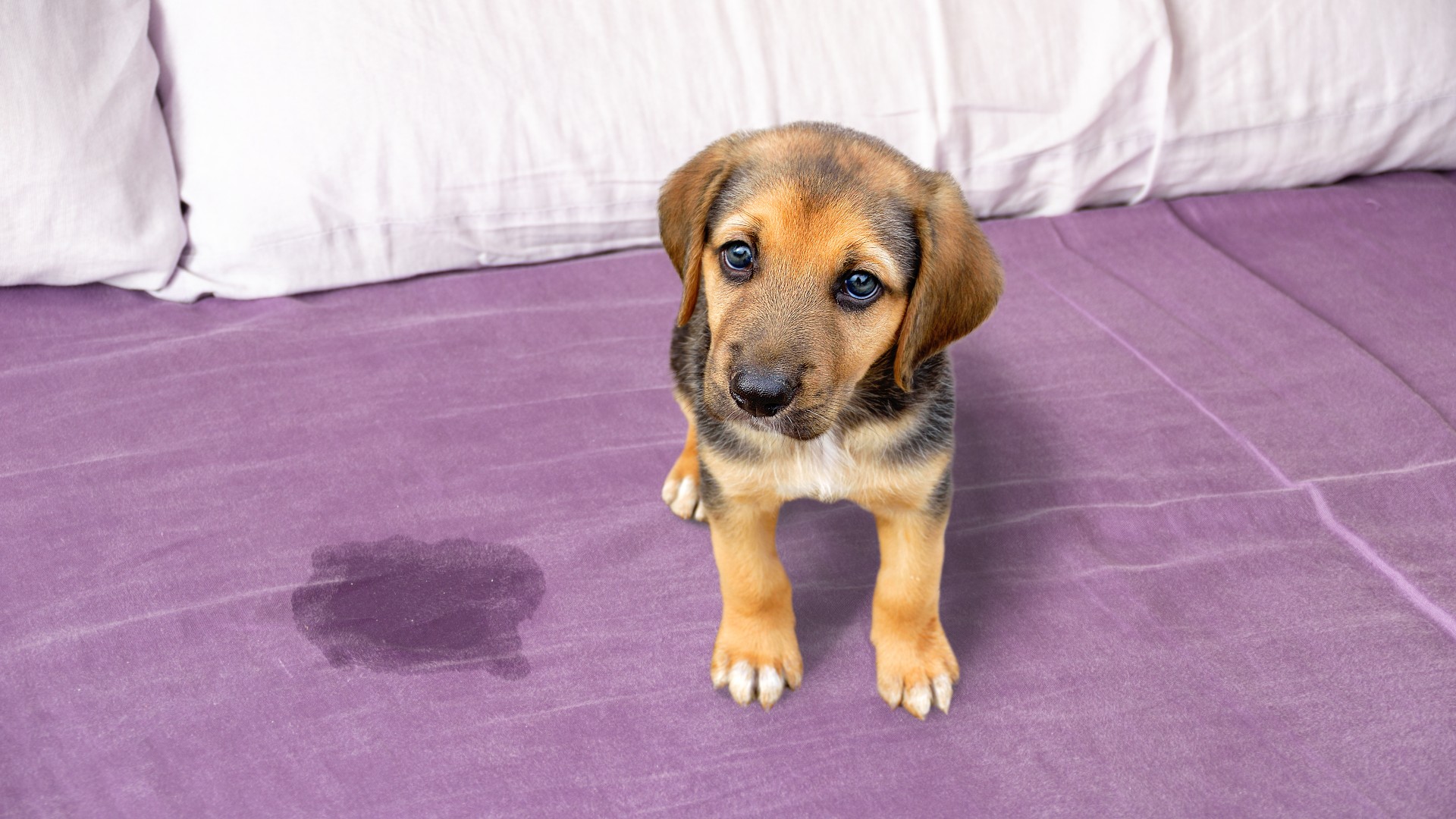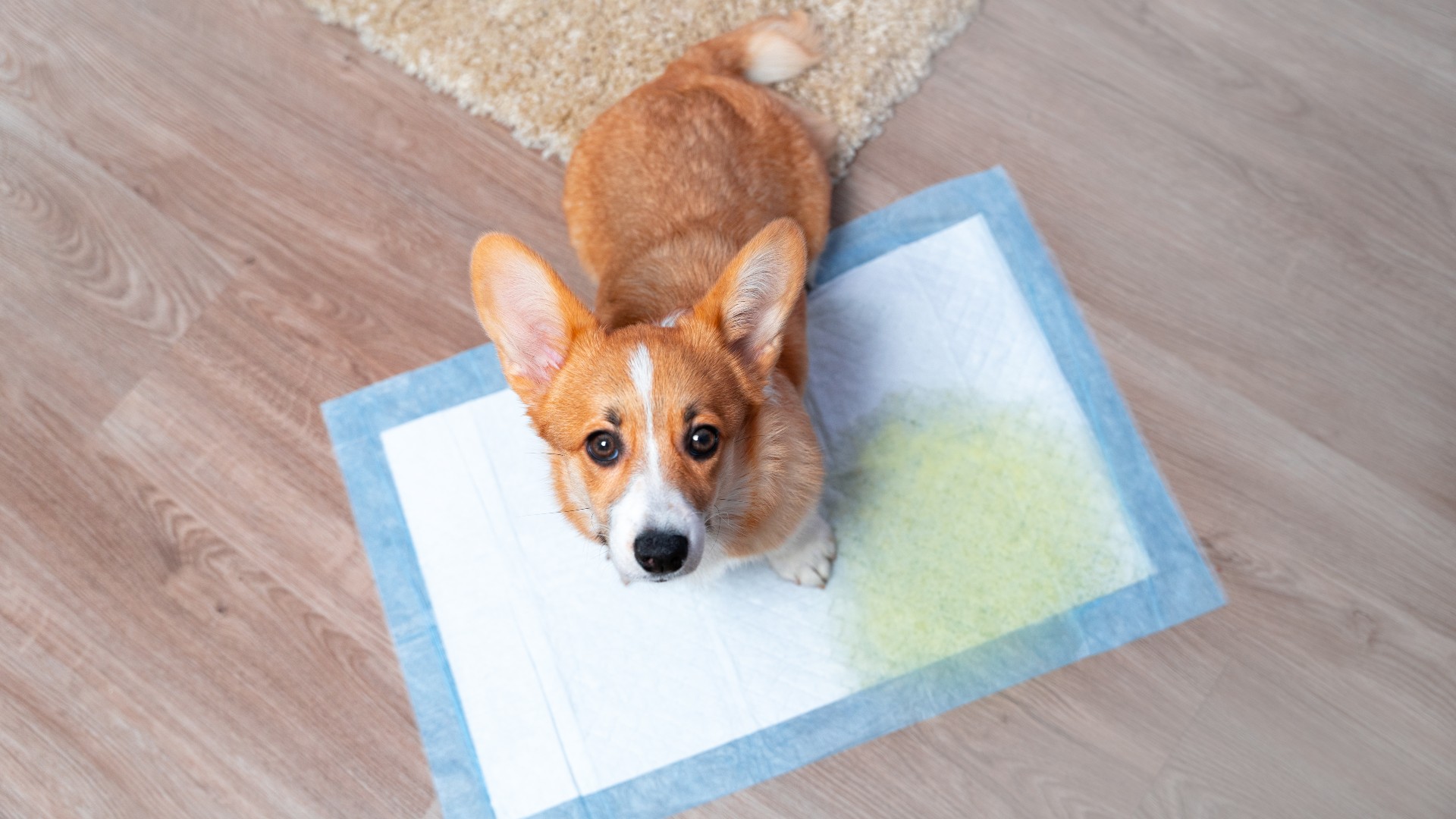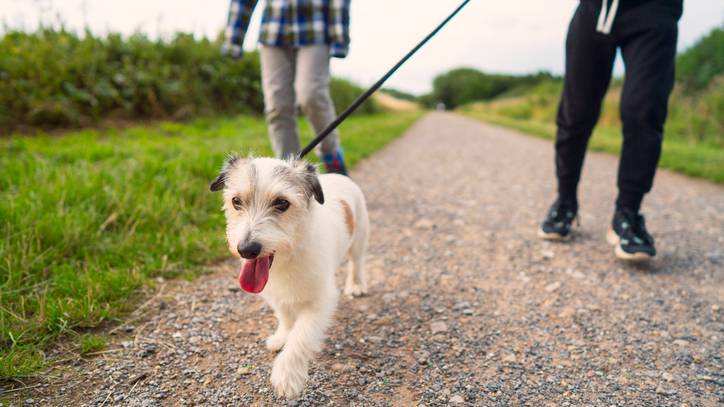How to stop your dog peeing in the house
If you want to know how to stop your dog peeing in the house, look no further - we have the answers, plus why it's happening in the first place

Get the best advice, tips and top tech for your beloved Pets
You are now subscribed
Your newsletter sign-up was successful
If your pooch has started urinating inside, this guide is here to help you figure out how to stop your dog peeing in the house. Whether you have a puppy who has just been toilet trained, a young adult or a more senior dog dealing with incontinence, there are many reasons your pup may have started piddling where they shouldn’t.
If you’re asking yourself why is my dog peeing on my bed or looking for ways to get dog pee out of the carpet and floors, it’s important to understand why this is happening and what you can do to help, instead of getting mad at your pet.
While it can be incredibly frustrating, urinating in the house, whether it be a behavioral issue or driven by a health problem, is not something your pup can control. Below, we walk you through the various reasons why your dog may be peeing in the house and share our top tips on how you can get them to stop.
Why is my dog peeing in the house?
Your dog is either urinating inside because of a behavioral issue or because of a health problem and it’s important to identify the reason why. Watch their behavior.
If there have been changes to their environment and they’re not acting themselves (if they’re stressed or excited) it could be behavioral, but if they have other symptoms too, such as a loss of appetite or smelly urine, it’s probably medical.
Behavioral

If you suspect your dog urinating inside may be a behavioral issue, here are some of the most common causes:
1. Not being let out enough
If you’re blaming your dog, remember it could be down to you. If they’re drinking a lot and not being let outside enough to use the toilet, it won’t be their fault they need to go indoors. However, make sure you monitor how much they’re drinking.
Get the best advice, tips and top tech for your beloved Pets
It’s normal for a dog to drink more if it’s hot, if they’ve eaten something different-or exercised more, but if you notice they’re very thirsty every day it could be something more serious such as diabetes, Cushing's disease, or a kidney infection, so get them checked by a vet.
2. Weather
Don’t get cross if it’s pouring with rain or sweltering hot and your dog doesn’t want to go outside to relieve themselves. Let’s be honest, we wouldn’t want to either!
But, you can encourage your canine companion by going with them, giving them treats or, better still, building them a shelter so they can go outside and not get wet or be in the shade if it’s too hot.
3. More training needed
If you have a new, young bundle of fur and they’re peeing in the house, you may find our guide to how to potty train a puppy useful when it comes to helping them to learn the ropes quickly.
For puppies that are already well underway with their toilet training, it could be that they simply need a bit more time to get the hang of it - especially if you’ve just moved them from puppy pads to going to the toilet outside.
Older dogs can also have setbacks when it comes to training, especially if they’ve been through a difficult time such as a rescue dog who has been moved around a lot or if they’re uncomfortable with a new situation like a new pet in the house.
4. Anxiety or fear
Your dog may start urinating inside if they are anxious or scared. This could happen if you hold a party and there’s lots of new faces, if there are fireworks and they’re scared of the noise or even if you’ve shouted at them for doing something they shouldn’t have done.
Dogs that have come out of abusive situations may display submissive urination if you pet or instruct them because of past fears or if they’re not the alpha dog.
It could also happen if there have been changes in their circumstances or environment: if you’ve started going back to work and they’ve got separation anxiety, if there’s a new pet or baby in the house or even if you’ve just moved the furniture around or changed their walk time.
Watch their behavior for signs of stress such as not wanting to eat, being restless or panting lots and visit the vet if you’re concerned.
5. Overexcitement
You may find your dog (generally puppies) urinates when you greet them at the door or if they get too excited because of sensory overload. Try to keep your arrival low key, pet them differently or avoid eye contact to see if it stops.
6. Marking their territory
Territory marking is a natural, instinctive behavior for dogs and unneutered male dogs especially may pee in the house to mark their territory. Try to discourage the behavior and treat them when they urinate outside, but neutering your dog may help.
Health

An underlying health issue is another reason your dog could be peeing in the house. Some of the most common health problems that can contribute to this include:
1. Incontinence
As they get older, the muscles around your dog’s bladder may weaken meaning they are unable to control when they urinate. However, incontinence in dogs can be a problem for young pups too. Check with your vet to understand if there’s a reason other than age that they cannot control it.
2. Arthritis
Arthritis and joint pain in dogs is another common cause of incontinence that’s worth being on the lookout for. As your dog’s bones deteriorate, the joint pain they experience might mean it hurts too much for them to move to go to the toilet and they end up having accidents.
3. Cognitive issues
Older dogs may forget to go to the toilet outside as their cognitive abilities decline. Dog dementia and other neurological diseases may mean their brain cannot instruct the bladder leading to accidents.
4. Urinary tract infection
A urinary tract infection is when bacteria causes pain and inflammation by entering the urinary tract through the urethra.
You can usually identify this as your dog may start to urinate more often or you may notice their ruin smells or contains blood. They may just need antibiotics, but other bladder issues may need surgery so get them looked at.
5. Disease
There are many diseases that may cause your dog to have accidents in the house. This includes diabetes, kidney or liver disease, Cushing’s or Addison’s disease or cancer.
Look out for other symptoms such as a change in appetite, lack of energy, change in mood and skin.
6. Medication
If your dog is on any medication, have a discussion with your vet around the side effects to ensure that this is not causing them to need to urinate more often.
How to stop a dog from peeing in the house

Once you’ve established whether the problem is behavioral or medical you can try to fix it. Here are our top tips:
1. Take them out more
If your dog is drinking a lot or peeing a lot it may be as simple as taking them out for more toilet breaks. If you’re not there to take them outside, make sure they have potty pads to use or even dog nappies.
2. Re-train your dog
If your puppy or dog is having setbacks it may be time to start house training them again. If they’re only peeing in the house at night, make sure you’re taking their water bowl away in the evenings, take them out before bed, and set an alarm so you’re waking up before them. They may need to sleep in a crate until they’re fully trained.
3. Avoid triggers
If your dog is peeing in the house ask yourself if anything has changed for them. Do you have a new pet or baby? Have you moved anything around in the house or changed their routine? Have you had more visitors or are there any new noises? These changes may be causing your pet anxiety so try and remove the problem or help them adjust to the change.
Stress is not the only trigger. If your dog is avoiding going outside because of bad weather, try and find a solution such as a covered or shaded area in the garden. If they’re urinated because they’re overexcited, try to keep them calm. If you know what the problem is they can all be tackled.
4. Keep it clean
When your dog pees indoors it’s important to make sure the spot is cleaned thoroughly with an enzymatic cleaner, especially if they are territory marking as you don’t want them to smell the scent and return to the spot.
5. Spay or neuter them
Dogs are much less likely to urinate to mark their territory if they are spayed or neutered.
6. Be patient
The number one rule when potty training your dog is not to punish them if they have an accident or urinate inside. They do not understand what they’ve done wrong and shouting at them or punishing them will only make things worse. Instead focus on praising and rewarding them when they urinate outside instead.
7. Keep them comfortable
If you have an older dog suffering from an age-related illness such as dementia, arthritis or incontinence you can give them medication which may help, but they may still have accidents. The best thing to do is to make sure they’re as comfortable as possible. If you want to avoid a smelly house you could limit their area in the house or use doggy nappies.
8. Speak to a dog trainer or animal behaviorist
If the issue is behavioral and you can’t find a solution you may need outside help from an expert.
9. Visit the vet
If you’ve done everything on this list and you’re still worried or if you’ve identified other symptoms that could mean a health problem, visit the vet to see what can be done to help.
Read next: Can dogs use cat litter?

